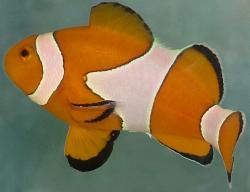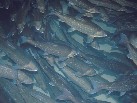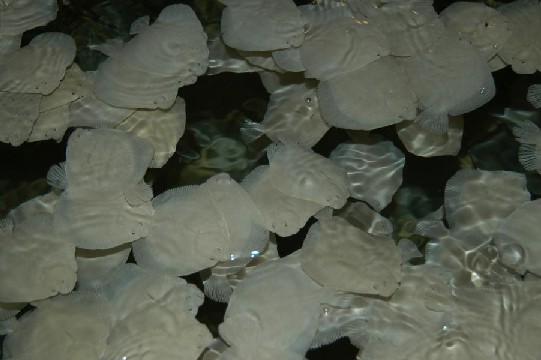
False clown anemonefish, Amphiprion ocellaris

Arctic charr, Salvelinus alpinus alpinus

C. loricula larva, day one
Nutrition and health of farmed aquatic animals
Aquaculture Wales and UWS academic researchers are engaged in a range of applied feed development and health management projects, including:
“Influence of dietary protein source on feed digestibility and faecal properties of marine fish”. A research project (incorporating PhD studentship), jointly funded by Aquaculture Wales, University of Wales Swansea and a commercial aquafeed producer.
“Evaluation of processed marine polychaete worms in formulated diets for fish and crustacea”. A commercial development project supported by the Welsh Assembly Government and Welsh Development Agency.
"Ontogeny of disease resistance mechanisms during larval development of the green shore crab, Carcinus maenas". A commercially supported PhD studentship, funded by the UK NERC.
Cultivation of tropical marine ornamental species
The Aquaculture Wales team are applying their combined expertise in technical aquaculture and sustainable development, to develop transferable production technologies for tropical marine fish and invertebrates.
Current species of interest include dwarf angelfish, clownfish, cleaner shrimp and giant clams.
Collaborative links include the Malaysian Semporna Islands Project, through the UK Marine Conservation Society.
Effluent management in land-based aquaculture production systems
Aquaculture Wales is working in partnership with UWS academic researchers and commercial companies to improve methods for treating dissolved and solid effluents from fish farms.
Current research projects include:
“AquaEtreat”, a collaborative EU-funded project directed at treating, valorising and reusing fish farm wastes. See project website for further information.
“Microbial community structure in saline wetlands treating organic waste from land-based fish farms”. A commercially supported PhD studentship funded by the UK NERC. Involves a molecular microbiological approach to assess nitrification activity in bioremediation wetlands.
Contact web master� AqWa, School of Environment and Society, University of Wales Swansea (2005)
Developing Sustainable
Aquaculture Solutions

Flame angelfish, Centropyge loricula
